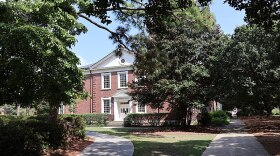State Senator Martin Nesbitt will be laid to rest today near his hometown of Asheville. The Democratic leader of the Senate died last week of stomach cancer after more than three decades in the legislature. WUNC's Capitol Bureau Chief Jessica Jones and WCQS news director David Hurrand joined Eric Hodge to talk about Sen. Nesbitt's legacy.
ERIC HODGE: Jessica, Martin Nesbitt's death came as a surprise to most people. He resigned last Tuesday, citing an undisclosed illness, returned home to Asheville, and then died Thursday. You're in the legislature all the time and I wonder if you can give us an idea of what Sen. Nesbitt's presence was like there.
JESSICA JONES: He was a person who was very comfortable in his own skin and he was very greatly respected by people on both sides of the aisle. I can say this as a reporter who covers the General Assembly: Sen. Nesbitt was the legislator who really was closest to the press, especially during these last few sessions from the Democratic side. As minority leader of the Senate, he held weekly briefings during the legislative session to keep reporters up to date on what was happening from the Democratic point of view. He really was a master at getting a message out. He understood how to deliver it. He didn't mind answering tough questions from reporters. He always had a great answer to explain his point of view and he was always even keeled and even tempered. It was always fun to watch him. It was just fun to watch how he dealt with questions and how he would deliver a great line or a great story to get his point across.
HODGE: David, tell us about Martin Nesbitt's connection with his constituents there in Asheville. He obviously enjoyed solid support there in the 49th District.
DAVID HURRAND: I would echo was Jessica said about him being comfortable in his own skin. A law school friend and colleage of Nesbitt's told me he was comfortable with people from all walks of life - working class people to the very wealthy - and highly respected by Democrats and Republicans in western North Carolina, without a doubt.
HODGE: David, what does it mean for Asheville to lose such a big voice in the state legislature and the capital?
HURRAND: It's a huge loss for the Democratic party in western North Carolina, and for that matter, it's a huge loss for the people of western North Carolina, whether they be Democrats or Republicans because for many years, it's been thought that western North Carolina didn't get its fair share of state dollars or for that matter the attention of lawmakers in Raleigh. Beginning with Liston Ramsey, who was elected Speaker of the House four consecutive times, and Martin Nesbitt in a sense studied at the desk of Liston Ramsey, really changed everything in terms of putting western North Carolina on the map and getting some of the attention and some of the dollars necessary to build various institutions, especially the university system, the community college system, the ag. center, and the arboretum. So many things made possible because of the legislative prowess of Martin Nesbitt.
HODGE: You've both talked about his ability to work with both Republicans and Democrats. Let's listen to what Republican Rep. Nathan Ramsey of Buncombe County had to say about Sen. Nesbitt.
REP. NATHAN RAMSEY: Nesbitt had a way of speaking to average people that was really hard for a big urban progressive to do, because he was from the mountains. He was from the city of Asheville, but at the end of the day, he represented sort of small town, rural North Carolina from a progressive viewpoint. There (are) not many voices out there that are able to do that, and I think that was his political genius.
HODGE: David, what do you think the people of Asheville will remember the most about Sen. Nesbitt?
HURRAND: I think his devotion to public education, which started with his parents - both his parents were educators - and his commitment to the region across so many different issues. But the signature piece of legislation, I think, is the Clean Smoke Stack Act. His friend and colleage at the time, state Sen. Steve Metcalf, told me it was during negotiations that led to passage of that bill where he saw firsthand Nesbitt's skill as a lawmaker and negotiator. There were many interest groups at the table. It took a lot of work to get passage of that bill back in 2002. When you think about it, utilities at the table - Duke and Progress Energy at the time - environmental groups, business groups, health care advocates, but Nesbitt was able to steer passage of that bill.








